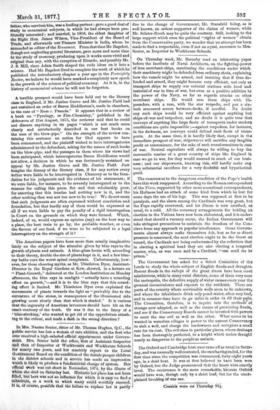A terrible prospect would have been held out to the
literary clans in England, if Mr. Justice Grove and Mr. Justice Field had not sustained an order of Baron Huddleston's, made in chambers, in the case of " Ross v. Francis." It appears that in a review of a book on " Pyrology, or Fire.Chemicitry," published in the Athena nm of 21st August, 1875, the reviewer said that he could not discern anything in its pages "which is not much more clearly and satisfactorily described in our best books on the uses of the blow-pipe." On the strength of the review con- taining this sentence an action for libel appears to have beet commenced, and the plaintiff wished to have interrogatories administered to the defendant, asking for the names of such books on the blOw-pipe, and the passages in them where his views had been anticipated, which interrogatories Baron Huddleston would not allow, a decision in which he was fortunately sustained on appeal by Mr. Justice Grove and Mr. Justice Field. Just imagine the dismay of the literary class, if for any review every Writer were liable to be interrogated in Chancery as to the fonn- da:tiCin for his judgments and the evidence of his statements ; if We were liable, for instance, to be severely interrogated as to the masons for calling this poem flat and that scholarship poor, for asserting that this treatise had nothing new in it, and the other nothing that was not too new to be true! We do not mean -that such judgments are often etpresiied without conviction and -foundation, brit that hardly any of them would be expressed at if we were liable to pay the penalty of a rigid interrogation in Court on the grounds on which they were formed. Which, indeed, of us, would express an opinion (say) on the best way to a place; the best train to go by, the probable weather, or even the flavour of our food, if we were to be subjected to a legal Interrogatory on the strength of it ?


































 Previous page
Previous page